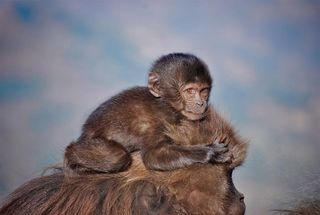Are We The Only Animals That Species To Abort
Pregnant Monkeys Expel to Avoid Infanticide

When a new male gelada monkey takes control of a reproductive group, he will typically impale off the babies of his predecessor. At present, new research shows that pregnant females accept an adaptive strategy to minimize their losses: They spontaneously miscarry.
In 1959, biologist Hilda Bruce offset demonstrated the so-called Bruce result in mice, where recently pregnant females miscarry afterwards existence exposed to novel males. Since and then, researchers have documented the phenomena in other rodent species. Yet, until at present, the Bruce effect seemed to exist something restricted to the laboratory, every bit nobody had conclusively shown that information technology exists in wild beast populations. Moreover, studies have not shown that at that place is any evolutionary reward to miscarrying when confronted with new males.
To see if the Bruce effect exists in gelada monkeys (Theropithecus gelada), Jacinta Beehner, an anthropologist at the Academy of Michigan, and her colleagues tracked 110 females across 21 groups of wild geladas living in the Simien Mountains National Park in Ethiopia. [Gallery: Photos of Gelada Monkeys]
"We saw that every bit soon as a new male came into a grouping, there were no births for the next half-dozen months," Beehner told LiveScience. In fact, the researchers documented simply 2 births in these replacement groups in the v years of the written report. "We become this big gap, screaming out that something is going on — it'southward statistically almost impossible to go this past chance."
To be sure what they were seeing was indeed the Bruce upshot, the researchers also took hormonal data from the fecal samples of females earlier and subsequently a new male arrived. Out of the 10 cases of pregnancies the researchers looked at, eight of the females miscarried inside two weeks of a new male coming on to the scene. Most surprising to the researchers, the miscarriages happened the same day the male took over.
Of the ii females that didn't expel, one quickly showed signs of fertility swelling and somewhen mated with the new male person while even so meaning. The other didn't, and probably as a issue, the male killed her baby, but didn't kill the babe of the female with whom he mated. This beliefs suggests that the males figure out which babies are theirs simply by knowing which females they mated with, Beehner said.
Females that miscarried as soon every bit new males arrived as well became pregnant once again, and the researchers saw a twofold increase in births during the 7 to 12 months later new males took over. They also found that females that experienced such primate infanticide took longer to get pregnant again, suggesting these miscarriages are evolutionarily advantageous to the mama monkeys.
Peter Brennan, a physiologist at the University of Bristol in the Great britain who was non involved in the research, said that the report was quite convincing. "It's a great example of pregnancy block being demonstrated quite convincingly in the wild," said Brennan, who has studied the Bruce effect in lab mice. "And at that place's good evidence that it'southward adaptive in evolutionary terms."
Brennan is curious as to exactly how the females miscarry. In lab mice, he notes, females miscarry after picking up on chemical signals put off by the new males. "The actual physiological mechanism [in geladas] may be different," he said, adding that the miscarriages might be a response to social stress.
Beehner said that the side by side step is to pinpoint this mechanism, though this research cannot be conducted on a threatened wild primate like the gelada. Domestic horses may exist adept candidates for further inquiry, as scientists have seen the Bruce event in the species before, she said.
Follow LiveScience for the latest in science news and discoveries on Twitter @livescience and on Facebook .
Source: https://www.livescience.com/18629-pregnant-monkeys-miscarry-avoid-infanticide.html
Posted by: howletthanceseles1941.blogspot.com

0 Response to "Are We The Only Animals That Species To Abort"
Post a Comment